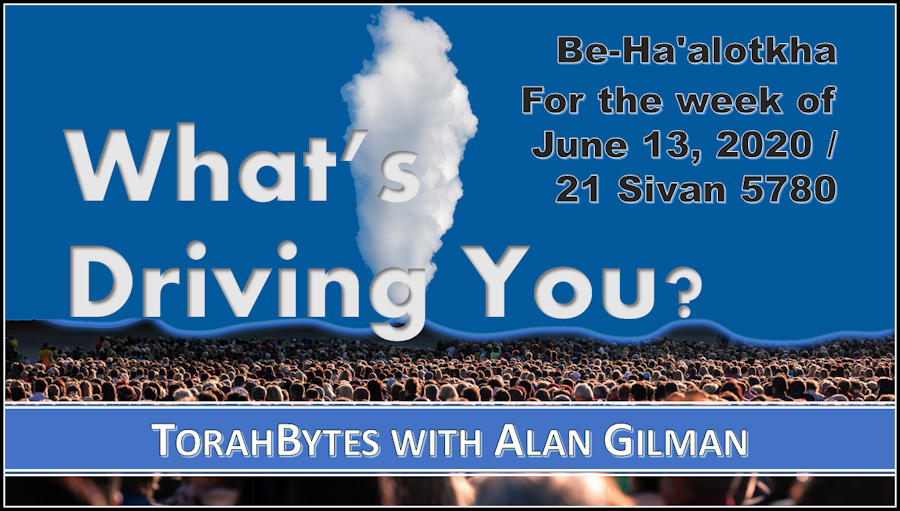Your cart is currently empty!

What’s Driving You?
For the week of June 13, 2020 / 21 Sivan 5780
Be-Ha’alotkha
Torah: B’midbar/Numbers 8:1 – 12:16
Haftarah: Zechariah 2:14 – 4:7 (English: 2:10 – 4:7)
Download Audio [Right click link to download]
At the command of the LORD the people of Israel set out, and at the command of the LORD they camped. As long as the cloud rested over the tabernacle, they remained in camp. (B’midbar/Numbers 9:18)
I am a big picture guy. That’s true in nature as well as stories and ideas. I love grand views and vistas, be it wide mountain ranges or hills and valleys from above or looking back at the skyline of a great city. I love big pictures because I also love the details they encompass. The better I can see the big picture, the more I understand its details. In stories, the Bible included, between its big picture and details are themes and motifs. Themes are ribbons of ideas, common subplots woven through events and descriptions. Motifs are recurring story elements. God’s love, mercy, and justice are biblical themes. The dynamics of how humans interact with God’s will is a common motif.
We first encounter this motif in the Garden of Eden (see Bereshit/Genesis 3). God gives clear directives to Adam and Eve, which are soon challenged by the serpent. The reader can sense the peril that awaits our first parents should they give into the temptation to doubt the goodwill of their creator, which tragically they do. This motif is played out over and over again throughout Scripture, including this week’s parsha (Torah reading portion).
Israel’s journey through the wilderness is a time of training between their slavery in Egypt and their conquest of the Promised Land. Having been given the gift of God’s word through Moses, the difficult challenges of wilderness living provides opportunity after opportunity to discover the nature and character of their God.
Like Adam and Eve before them they are instructed that obedience to God results in life and blessing, while rebellion results in death and destruction. One of the many ways this was to be lived out was in their travel directions. God reserved the right to tell them when they were to break camp and where they were to go next. The indication of when to go and where was provided by a pillar of cloud. If it stayed, they were to stay. When it moved, they were to move until it stopped.
Our translation expresses God’s communication via the cloud as being at “his command.” While capturing the intent of the Hebrew metaphor here, it misses its vividness. The Hebrew reads more along the line of “At the mouth of the LORD the people of Israel set out, and at the mouth of the Lord they camped. The picture painted by the metaphor is one of God’s speaking, key to the motif we are looking at. What’s not clear is whether it’s the cloud’s movement that’s in response to God’s speaking or that the movement of the cloud was the indication of God’s speaking. Either way, the people were to learn to embark or settle exclusively in response to God’s word.
Note the implications of this. If God’s word was to be their only guide, then that means they were not to listen to anything or anyone else. Enemies attacking? No cloud movement. Stay put. Water supplies exhausted? No cloud movement. Stay put. Living in a lush oasis? Cloud is moving. Time to go. Circumstances, preferences, and opinions don’t count. Only God’s word.
Should it be any different for us today? There’s no cloud to follow that I know of. Yet we have something more, not less, than the ancient Israelites. We have far more of God’s written word than they had. In the books of the Hebrew and New Covenant Scriptures we have more direct words from God; more examples, good and bad; more truth sorted out than they did. Plus, under the New Covenant, we have a far greater intimacy with God through the Messiah and the gift of the Ruach HaKodesh (English: the Holy Spirit) empowering us. It’s as if the wilderness cloud has now taken up residence within us.
Are we being driven by voices shouting at us or are we listening to God? That in no way diminishes the issues of our day, but it should determine what we do about them. The listening to God motif of Scripture clearly directs us to avoid being reactive. Circumstances and opinion are blind guides. Only God’s direction leads to life.
It feels good to connect to popular causes, but at what cost? What would happen if you stopped, took a deep breathe, and asked God what to do? His direction may not take you where you think you should go, but it’s the only way to ensure you get to where God wants you to go.
Scriptures taken from the English Standard Version
